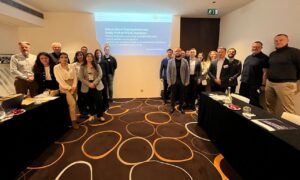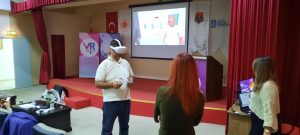"Aligning the goals of detention and rehabilitation with recruitment, retention, and professional development strategies in European prisons" is a recently published paper advocating for comprehensive training to empower prison officers and create more effective and rehabilitative prison systems in Europe.
In a significant step towards enhancing the quality of correctional justice systems in Europe, a group of team members and project partners from the ERASMUS+ project CCJ4C – European Career Counselling Guidelines for Staff Working in Criminal Correctional Justice System – have recently published an article in Prison Service Journal.
The paper, titled “Aligning the goals of detention and rehabilitation with recruitment, retention, and professional development strategies in European prisons“, sheds light on the crucial role of professional development in modern prison culture, recruitment, retention, and rehabilitation efforts.
The paper presents the outcomes of an extensive literature review and an analysis of an online survey conducted among prison officers from several European countries. The online survey was distributed in the five languages of the CCJ4C project consortium. It gathered responses from prison officers from at least two prisons in each partner country, offering valuable insights into the correlation between professional development and various aspects of prison culture and officer satisfaction.
Positive link between training, motivation, and job satisfaction among prison officers
The key findings of the survey indicate that training and professional development have a positive impact on prison officers’ motivation to remain in their careers. Respondents who felt positively about the training they received also displayed positive attitudes towards other aspects of their job. This suggests a strong link between training, motivation, and overall job satisfaction among prison officers.
Moreover, the paper highlights the contribution of professional development to ongoing prison reform. Officers who believed they received sufficient training to perform their duties effectively demonstrated higher levels of motivation and engagement in their work, contributing to a positive prison culture and better correctional outcomes for individuals in their care in prison facilities.
One of the most striking findings of the research was the strong correlation between public service pride, open-minded management, and community recognition. Recognizing and respecting the work of prison officers was found to be critical in building a supportive community within correctional facilities.
Line managers were identified as key influencers in encouraging officers’ professional development by providing direction, support, and motivation to participate in training opportunities.
The need for further research: The impact of prison officer career development on offender rehabilitation
The paper also suggests that more research is needed to understand the impact of officer perceptions on training and societal awareness. Understanding these dynamics could drive significant changes in training, recruitment, and public awareness, leading to better prison environments and improved rehabilitation outcomes.
Particularly, the authors also point out areas for future research in this field, emphasizing the need to explore the effectiveness of different types of career guidance for prison officers and the impact of career development on prison culture and rehabilitation outcomes.
Transforming European prisons: empowering officers for better correctional outcomes
The study challenges traditional approaches to career progression, indicating that routine checklist reviews may be outdated. Instead, the authors propose embracing new methods that empower prison officers and foster a learning culture within the prison system.
Overall, the publication of this article marks a significant advancement in the understanding of the role of professional development in European prisons. By recognizing the importance of empowering prison officers through comprehensive training and support, the findings underscore the potential for positive transformation in prison culture and the lives of both inmates and staff. This research encourages continued efforts towards building a more rehabilitative and effective correctional justice system across Europe.
The paper has been co-authored by Inês de Castro, a consultant working at IPS’s portfolio of projects in “Rehabilitation, Reintegration, and Community”, and other representatives from partnering organisations involved in the CCJ4C project, including Rhianon Williams, Carmen-Valeria Baias, Autun Purser, Alexander Vollbach, and Daiana Huber.
CCJ4C – a project that focused on career counselling in European correctional systems
The CCJ4C project aimed to address the lack of professional guidance and support for practitioners working in the evolving prison systems within the European Union. Over the past two decades, the prison systems have undergone significant changes, making it necessary to analyse the process of cultural change in correctional settings. The project focuses on examining the career development of prison staff and the support provided to prisoners. Its ultimate goal was to identify an ideal approach for developing career management skills of prison staff and understand how elements of this model can influence changes in public policy.
Learn more about this project

CCJ4C
European Career Counselling Guidelines for Staff Working in Criminal Correctional Justice System
The CCJ4C project brought together project partners from Romania, Portugal, Germany, Turkey, Malta, Lithuania, The Netherlands, United Kingdom, and Norway to collectively address the challenges and opportunities in career counselling within the European correctional systems. IPS was proudly among these partners.
To learn more about CCJ4C go to www.careersincorrections.com
Related projects

SISWEC
Strengthening the skills of social workers in a Europe in crisis

PROMOTE
Promoting Integrated Professional Development for Prison Practitioners in Vocational Excellence for Offender Reintegration

Probationet
A flexible, multidisciplinary and transnational VET model for the PROBATION services and practitioners

PO21
European Prison Officers for the 21st Century

LEADCOR
Leadership development for occupational stress reduction in correctional settings

Itinerariul Dialog
Social dialogue for better prisons

IDECOM
Innovation, Development and Communication for a better Education in Prison Systems

ECOPRIS
Ecological Economics in Prison Work Administration

DIGITWG
DIGICOR Digital Transition Working Group
Related news

Pioneering new approaches to the integration of people who have been sentenced: Key insights for correctional professionals across Europe
Read More »
IPS-partnered initiative using VR technology to reduce reactive aggression in prisons awarded “Best Innovation Project” in Romania
Read More »
Enhancing child-friendly juvenile correctional training across Europe: IPS presents key findings at CRS 2025
Read More »





